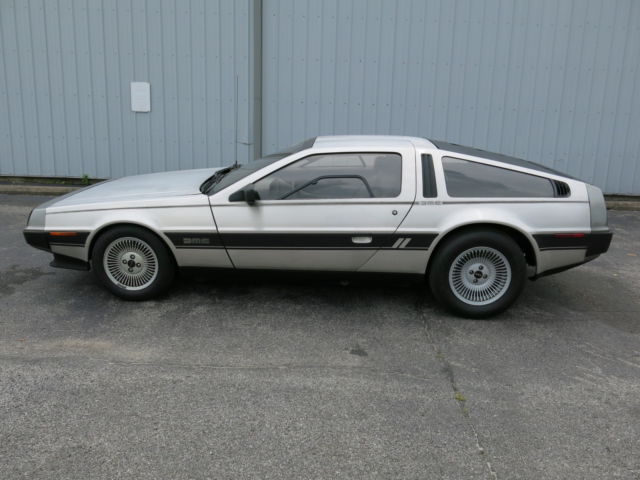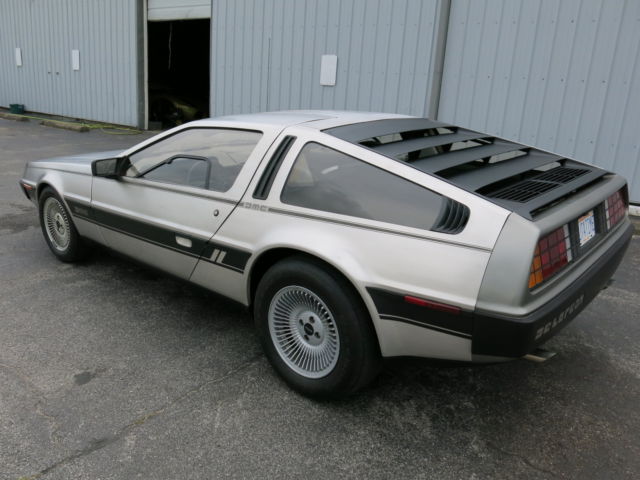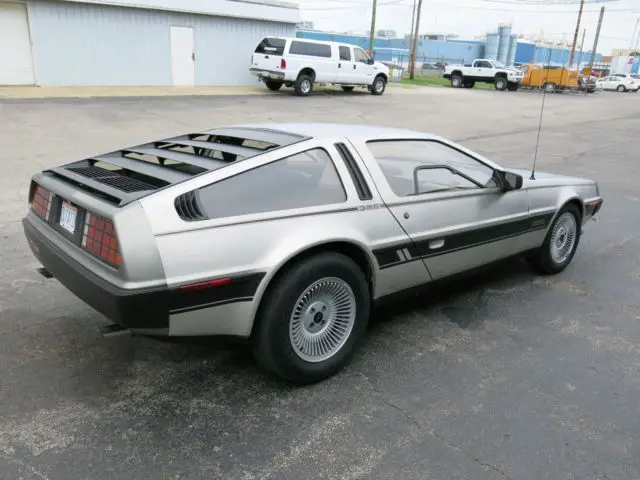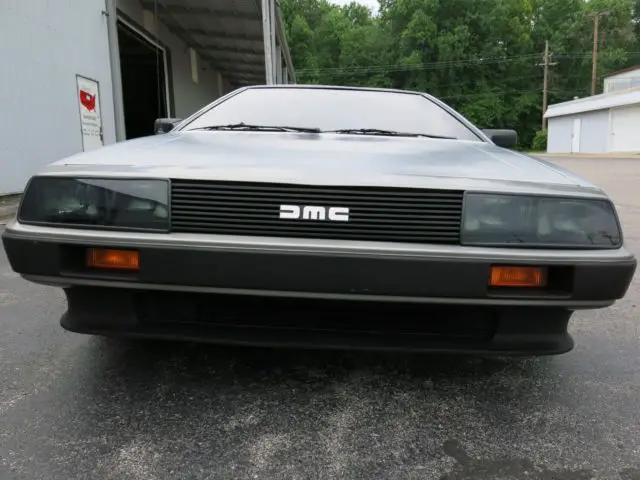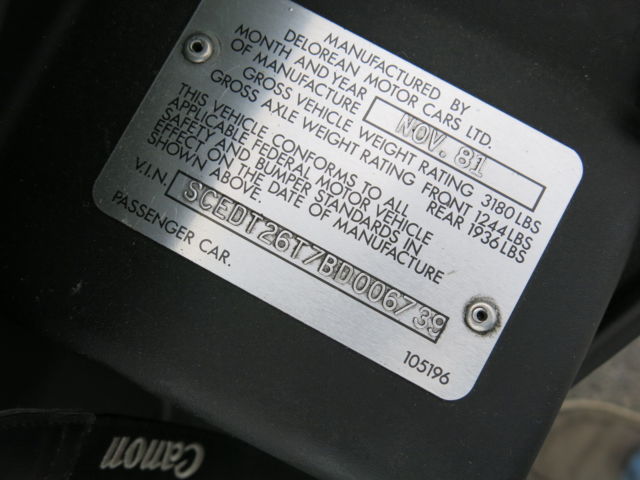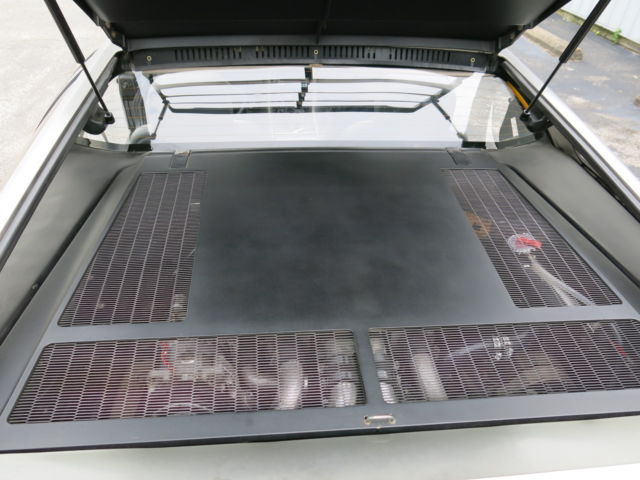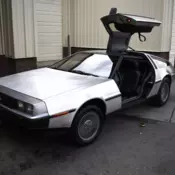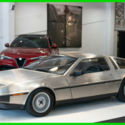1981 DELOREAN DMC-12 TWIN-TURBO COUPE, 37,600 MILES, MANUAL, RARE, SERVICED!!
| Make: | DeLorean |
| Type: | Coupe |
| Trim: | DMC-12 twin-turbo coupe |
| Year: | 1981 |
| Mileage: | 37,600 |
| VIN: | SCEDT26T7BD006739 |
| Color: | Silver |
| Engine: | 2.85L V6 |
| Cylinders: | 6 |
| Fuel: | Gasoline |
| Transmission: | Manual |
| Drive type: | RWD |
| Interior color: | Grey |
| Drive side: | Left-hand drive |
| Vehicle Title: | Clear |
| Item location: | Evansville, Indiana, United States |
1981 DeLorean DMC-12 twin-turbo coupe Additional Info:
have hadWe are proud to offer this very rare 1981 DeLorean DMC-12 twin-turbo coupe!! I have had this DeLorean inspected and
fully serviced at a cost of over $6,000.00. It drives great and turns heads everywhere it is driven! It is very well optioned
and is presented as it was built - the exterior color is correct, as is the interior and the factory & dealer installed options.
These DMC's have increased in value dramatically over the past few years and are beginning to hold a very strong
status as solid collectibles. Don't miss this chance to own this fantastic and rare example!
Additional Details:
(VIN: SCEDT26T7BD006739), SS304 brushed stainless steel with light grey leather interior, 37,600 indicated originalmiles with the desirable 5-spd. manual transmission. Many cars are known from starring roles on TV or in the movies,
but few are as well-known as the DeLorean DMC-12 - the car that took Michael J. Fox "Back to the Future" in 3 feature
films. Built from 1981-1982, the DMC-12 was the brainchild of former GM executive John Z. DeLorean. It was styled by
Italian stylist Giorgetto Giugiaro and the chassis was suspension engineered by Colin Chapman, founder and owner of
Lotus Cars. About 9,200 DMC-12s were produced between January 1981 and December 1982. In 2007, about 6,500
DeLorean Motor cars were believed still to exist. This vehicle has a clean CarFax report and has known ownership from
10/22/1991. It is a 3-owner car (the last two owners were physicians, both located in the midwest - Ohio and Indiana).
This vehicle was driven sparingly by the most recent owner, and registered for road use every year since 06/20/1998 -
the most recent registration renewal was 10/17/2016. Wanting for more power sometime in 1987, the second owner
installed a twin-turbo kit manufactured by Tom Dieckhoff of Turbo Manifold Co. in Wheatley Heights, NY. Twin IHI
RHB5 turbos, a new throttle body and exhaust manifolds and mufflers, and a list of other parts breathed new life into
the underpowered factory Peugeot-Renault-Volvo sourced 2.85L V6. The kit is exceptionally well made and is inte-
grated so well into the engine bay it could easily have been factory designed and installed. This DeLorean just received
a complete inspection and service at a cost of over $6,000.00., incl. flush of all fluids and change of all filters, fuel pump
relay, complete brake system refurbishment incl. new master cylinder and brake lines, new calipers, new pads and
machined rotors. The updated stainless steel coolant reservoir was installed, as well a new water pump and all gaskets
for the intake manifold. A fuel system treatment was added to clean injectors, valves, throttle body and intake manifold.
New hood and passenger door struts were also installed at this time. It runs and drives very well and the body and interior
are in excellent condition, with no signs of accident damage or repair. The DMC-12 was only available with two factory
options; a no-cost manual transmission and the choice of a grey or black interior. This example also has some dealer
installed options, including floor mats and black textured door accent stripes. It is rare to find an example in this condition
and with the low original mileage - not to mention the increase in performance from the very rare twin-turbo system.
During the last few years DeLoreans have experienced a bottoming out of values and now are on the rise as investment
grade collectibles!
Ownership history:
Purchased by Thomas Wilkin DVM 10/22/1991 with 35,591 miles (his practice is still open in Ohio and I am trying to reach him)
Owned by PO Dr. Sloan since 06/20/1998 with 36,000 miles
Registered every year with the last issued 10/17/2016
Dr. Sloan passed away in early 2017, when BMI acquired the vehicle
Options on this vehicle: $25,000.00 new MSRP
Manual transmission
Grey leather interior
Floormats (dealer installed option)
Door accent stripe, black textured (dealer installed option)
Smoked headlight lenses (dealer installed option)
Specifications:
Engine type: rear-mounted PRV (Peugeot-Renault-Volvo) SOHC V6
Weight distribution: 35% – 65% front–rear
Fuel type: Petrol
Fuel System: Bosch K-Jetronic fuel injection
Coolant : Water
Engine Alignment: Longitudinal
Engine size: 2849 cm3 or 173.9 cu-in
Bore x Stroke: 91.00 x 73.00 mm or 3.58 x 2.87 inches
Compression ratio: 8.8:1
Number of valves: 12 Valves
Maximum power: 130 bhp or 97 kW @ 5500 rpm
Maximum torque: 152 lb.ft @ 5500 rpm
Drive wheels: RWD
Steering: rack and pinion
Steering ratio: 14.9:1
Turns (lock to lock): 2.65
Transmission Gearbox: 5-speed Manual sourced from Renault
Fuel tank capacity: 13.5 US gallons
Front suspension: unequal length A-arms, coil springs, tube shocks and anti-roll bar
Rear suspension: semi-trailing arms, upper and lower lateral arms, coil springs and tube shocks
Brakes:
Front: 10.0 inch Discs
Rear: 10.5 inch Discs - vacuum assisted
Swept area: 541 sq. in.
Rims: cast aluminum alloy, 14x6 front and 15x8 rear
Tire Size: 195/60HR-14 (Front) - 235/60HR-15 (Back)
Dimensions:
Length: 168.1 in OR 4270 mm
Width: 72.8 in OR 1849 mm
Height: 46.1 in OR 1171 mm
Front / Rear track: 65.4/62.6 in OR 1,661/1,590 mm
Wheelbase: 94.8 in OR 2408 mm
Ground Clearance: 5.5 in OR 140 mm
Cargo Volume: 14 cu-ft OR 396 L
Curb weight: 2,840 lbs.
The DeLorean DMC-12 was a sports car manufactured by John DeLorean's DeLorean Motor Company for the American market from 1981-1983. The first prototype appeared in October 1976. Production officially began in 1981 in Dunmurry, a suburb of southwest Belfast, Northern Ireland, where the first DMC-12 rolled off the production line on January 21. The car features gull-wing doors and an innovative fiberglass / glass reinforced plastic (GRP) underbody structure with a Lotus designed steel backbone chassis, with external brushed stainless steel body panels overtop. The gullwing doors, when opening, only require 11 inches clearance outside the line of the car, making opening and closing the doors in crowded spaces relatively easy. Under the rear hood is a 2.85L V-6 engine designed and built by Peugeot-Renault-Volvo under a special contract with the DeLorean Motor Company. Cloaking those mechanicals was a crisp body penned by Italian stylist Giorgetto Giugiaro that retained the flair of the DMC-12 prototype. The real talking point was the DeLorean’s rustproof stainless steel bodywork, which covered a fiberglass inner structure. Over the course of production, several features of the car were changed, such as the hood style, wheels and interior. About 9,000 DMC-12s were made before production halted in early 1983. As of 2007, about 6,500 DeLorean Motor cars were believed still to exist.
On October 1976, the first prototype DeLorean DMC-12 was completed by American automotive chief engineer William T. Collins, formerly chief engineer at Pontiac. Originally, the car was intended to have a centrally-mounted Wankel rotary engine. The engine selection was reconsidered when Comotor production ended, and the favored engine became Ford's "Cologne V6." Eventually the French/Swedish PRV (Peugeot-Renault-Volvo) fuel injected V6 was selected. Also the engine location moved from the mid-engined location in the prototype to a rear-engined installation in the production car. The chassis was initially planned to be produced from a new and untested manufacturing technology known as elastic reservoir moulding (ERM), which would lighten the car while presumably lowering its production costs. This new technology, for which DeLorean had purchased patent rights, was eventually found to be unsuitable. These and other changes to the original concept led to considerable schedule pressures. The entire car was deemed to require almost complete re-engineering, which was turned over to engineer Colin Chapman, founder and owner of Lotus Cars. Chapman replaced most of the unproven material and manufacturing techniques with those then employed by Lotus, like the steel backbone chassis.
The body design of the DMC-12 was a product of Giorgetto Giugiaro of Ital Design and is paneled in brushed SS304 stainless steel. Except for three cars plated in 24-carat gold, all DMC-12s left the factory uncovered by paint or clearcoat. Painted DeLoreans do exist, although these were all painted after the cars were purchased from the factory. Several hundred DMCs were produced without stainless panels, for training workers, and are referred to as "black cars" or "mules", in reference to their black fiberglass panels instead of stainless, though these were never marketed. Small scratches in the stainless steel body panels can be removed with a non-metallic scouring pad (since metal pads can leave iron particles embedded in the stainless steel which can give the appearance of the stainless "rusting"), or even sandpaper. The stainless steel panels are fixed to a fiberglass underbody. The underbody is affixed to a steel double-Y frame chassis, derived from the Lotus Esprit platform.
The unpainted stainless body creates challenges during restoration of the cars. In traditional automotive body repair, the panel is repaired to be as original ("straight") as possible and imperfections are sculpted back to form with body filler like Bondo or lead (body solder). This poses no problem (aside from originality) with most cars, as the filler will be hidden by the car's paint (for example, most new cars have filler hiding the seam where the roof meets the quarter panel). With an unpainted stainless body, the stainless steel must be reworked to exactly the original shape, contour, and grain—which is a tremendously difficult job on regular steel (a dented or bent panel is stretched and a shrinking hammer or other techniques must be used to unstretch the metal) and even more difficult with stainless due to its tendency to work-harden. Furthermore, it is exceedingly difficult to paint stainless steel due to difficulties with paint adhesion. DeLorean envisioned that damaged panels would simply be replaced rather than repaired; each DeLorean service center today has at least one experienced body repair person on staff, and there are decades worth of new stainless panels still available in most instances.
Another unusual feature of the DMC-12 is its gull-wing doors. The common problem of supporting the weight of gull-wing doors was solved by other manufacturers with lightweight doors in the Mercedes-Benz 300SL and a hydraulic pump in the Bricklin SV-1, although these designs had structural or convenience disadvantages. The DMC-12 features heavy doors supported by cryogenically preset torsion bars and gas-charged struts. These torsion bars were developed by Grumman Aerospace (and built by Unbrako in the UK, a division of SPS Technologies of Jenkintown, PA) to withstand the stresses of supporting the doors. A popular misconception of the DMC-12's gull-wing doors is that they require far more side clearance to open relative to ordinary side-hinge doors, such as when parked in a parking lot. In fact, the opposite is true: the DMC-12 requires far less clearance than side-hinge doors, and this can be physically demonstrated. This misconception of side clearance may stem from a misunderstood location of the hinge point of the doors by persons unfamiliar with DMC-12s. These doors, when opening, only require 11 inches (28 cm) clearance outside the line of the car, making opening and closing the doors in crowded spaces relatively easy. Much like the doors fitted to the Lamborghini Countach, the DMC-12 doors featured small cutout windows, because full-sized windows would not be fully retractable within the short door panels. Additionally, the doors featured red and amber "safety" lights around the perimeter. These lights illuminated when the door was open and could be seen from the front, rear or side of the vehicle at night or low light situations.
The engine is a Peugeot-Renault-Volvo (PRV) 2.85 litre V6, which produced about 130 hp, that was designed and built under special contract with the DMC Company. These PRV engines were a development of the 2.7 litre V6 in the Renault 30, and were built in the PRV Factory in Douvrin, Northern France. The gearbox, also designed by PRV, was built at the Renault facility near Caen in Normandy. The engines and gearboxes were shipped weekly by sea from the PRV Factories to the DMC Factory.
The suspension of the DMC-12 is a four-wheel independent suspension, coil springs, and telescopic shock absorbers. The front suspension uses double wishbones, while the rear is a multi-link setup. In its original development stages, the car is said to have handled quite well. Design drawings clearly show that the design met NHTSA minimum bumper and headlight heights of the time. Many owners have subsequently replaced or modified the front springs to return the front height to the original design specification.
Steering is rack and pinion, with an overall steering ratio of 14.9:1, giving 2.65 turns lock-to-lock and a 35-foot (11 m) turning circle. DMC-12s are fitted with cast alloy wheels, measuring 14 inches (360 mm) in diameter by 6 inches (150 mm) wide on the front and 15 inches (380 mm) in diameter by 8 inches (200 mm) wide on the rear. These were fitted with Goodyear NCT steel-belted radial tires. Because the DeLorean is a rear engine vehicle, the DMC-12 has a 35%–65% front–rear weight distribution. The DMC-12 features power-assisted disc brakes on all wheels, with 10-inch (250 mm) rotors front and 10.5-inch (270 mm) rear.
Bid with confidence - we have been a member of eBay since November 1998 and we have a 100% feedback rating!! We do have a complete collection of photographs that document every aspect of this vehicle, so please request them! And be sure to mail us if you have any questions! Please also keep in mind that this vehicle is being advertised via other retail venues, so we reserve the right to cancel this auction at any time and without notice.
God bless and good luck in bidding!
*This vehicle is located in Southern Indiana - more information or photographs are available upon on request. While every reasonable effort has been made to ensure the accuracy of the description of this vehicle, mistakes regarding hp ratings, options, etc. can be made. I have also done my best to be very honest and very critical about the cosmetic and mechanical condition of this vehicle. Of course, it is not always possible to pick-up on every minor detail or flaw. Please keep expectations realistic as this is a pre-owned vehicle, and I have personally found blemishes on brand new un-driven vehicles. If you are an exceptionally detailed oriented person, please contact me to verify any information directly, and I will do my best to specifically photograph anything you request and to answer any of your questions to the best of my ability.

